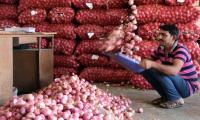India to Monitor Prices of 38 Food Items Daily: Govt
India's government will monitor daily wholesale and retail prices of 38 essential food commodities to stabilize rates and make policy interventions. The move aims to combat inflation and ensure food security.
New Delhi, Aug 1 (PTI) Union Food and Consumer Affairs Minister Pralhad Joshi on Thursday announced that the government will collect and monitor daily wholesale and retail prices of 16 more essential food commodities from August 1 to help it make policy interventions to stabilise rates.
The Department of Consumer Affairs has already been monitoring the daily prices of 22 essential food commodities from 550 centres across 34 states/Union Territories.
"We are now adding 16 more commodities, taking the total number of food items to 38 whose prices will be monitored on a daily basis," Joshi told reporters here.
The 16 food items are bajra (whole), jowar (whole), ragi (whole), suji (wheat), maida (wheat), besan, ghee, butter (pasteurised), brinjal, egg, black pepper, coriander, cummin seed, red chillies, turmeric powder and banana.
The Price Monitoring Division (PMD) in the department is responsible for tracking prices of selected essential commodities.
The minister also launched an updated 'PMS Mobile App Version 4.0', which will help price reporting centres to report daily on 38 commodities.
"We will get to know the actual price situation of 38 commodities on a daily basis. We will get information about the price rise. This will help in policy-making and stabilising volatility in prices," the minister said.
Consumer Affairs Secretary Nidhi Khare said, "The 38 commodities constitute close to 31 per cent of the total CPI (consumer price inflation) weights as against 26.5 per cent of CPI weights captured by the 22 commodities".
She noted that the RBI had also suggested the department to add more commodities for price monitoring.
The government was earlier monitoring 22 commodities -- rice, wheat, atta, gram dal, tur (Arhar) Dal, urad Dal, moong Dal, masur dal, sugar, gur, groundnut oil, mustard oil, vanaspati, sunflower oil, soya oil, palm oil, tea, milk, potato, onion, tomato and salt.
The minister informed that the government has allocated Rs 10,000 crore under the price stabilisation fund (PSF).
The fund has been set up to tackle inflationary trends of identified agri-horticultural commodities like onion, potatoes and pulses to protect the interests of consumers.
These commodities are procured and stored for regulated release to help moderate the prices. Such market intervention by the government would not only help send the appropriate market signal but also deter speculative/hoarding activities.
The Department of Consumer Affairs has already been monitoring the daily prices of 22 essential food commodities from 550 centres across 34 states/Union Territories.
"We are now adding 16 more commodities, taking the total number of food items to 38 whose prices will be monitored on a daily basis," Joshi told reporters here.
The 16 food items are bajra (whole), jowar (whole), ragi (whole), suji (wheat), maida (wheat), besan, ghee, butter (pasteurised), brinjal, egg, black pepper, coriander, cummin seed, red chillies, turmeric powder and banana.
The Price Monitoring Division (PMD) in the department is responsible for tracking prices of selected essential commodities.
The minister also launched an updated 'PMS Mobile App Version 4.0', which will help price reporting centres to report daily on 38 commodities.
"We will get to know the actual price situation of 38 commodities on a daily basis. We will get information about the price rise. This will help in policy-making and stabilising volatility in prices," the minister said.
Consumer Affairs Secretary Nidhi Khare said, "The 38 commodities constitute close to 31 per cent of the total CPI (consumer price inflation) weights as against 26.5 per cent of CPI weights captured by the 22 commodities".
She noted that the RBI had also suggested the department to add more commodities for price monitoring.
The government was earlier monitoring 22 commodities -- rice, wheat, atta, gram dal, tur (Arhar) Dal, urad Dal, moong Dal, masur dal, sugar, gur, groundnut oil, mustard oil, vanaspati, sunflower oil, soya oil, palm oil, tea, milk, potato, onion, tomato and salt.
The minister informed that the government has allocated Rs 10,000 crore under the price stabilisation fund (PSF).
The fund has been set up to tackle inflationary trends of identified agri-horticultural commodities like onion, potatoes and pulses to protect the interests of consumers.
These commodities are procured and stored for regulated release to help moderate the prices. Such market intervention by the government would not only help send the appropriate market signal but also deter speculative/hoarding activities.
You May Like To Read
TODAY'S MOST TRADED COMPANIES
- Company Name
- Price
- Volume
- Vodafone-Idea-L
- 11.65 (+ 3.56)
- 106772451
- Alstone-Textiles
- 0.28 ( -3.45)
- 44187760
- Mangalam-Industrial
- 0.88 ( -2.22)
- 39177573
- Sunshine-Capital
- 0.27 (+ 3.85)
- 35956340
- GMR-Airports
- 104.40 (+ 6.37)
- 30453005






